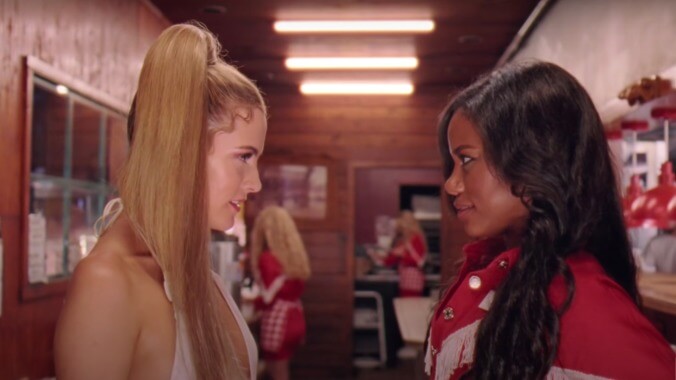When Zola becomes “@Stefani”: The filmmakers and Zola herself explain the unforgettable scene
“It was really fun to dumb ourselves down and think, ‘What is the worst way to tell this exact same story?’”
Image: Screenshot:
As far as adaptations go, Zola is remarkably faithful to its source material, the 148-tweet thread known as #TheStory. When director Janicza Bravo and her co-writer Jeremy O. Harris came on board to translate the words of A’Ziah “Zola” King to the screen, they set out to preserve her voice, her agency, in the too-wild-to-be-true odyssey she initially shared with the world. (King also served as an executive producer on the film.) Clearly enamored with King as a person and a storyteller, Bravo and Harris treat #TheStory as scripture, and Zola is the stylish vessel for her hallowed words. In doing so, Zola’s “Zola” (Taylour Paige) operates as both author and audience surrogate—the film almost never leaves her side as we watch her process the events that are spiraling out of control around her, forming the narrative in real time. In that sense, Zola is, in part, a story about storytelling, how we’re all the main characters in our day-to-day lives, and the embellishments we make, both big and small, to craft the stories about ourselves that we think people want to hear.
Though Zola remains loyal to King’s tweets, frequently committing them to film word-for-word, there’s one notable exception. Just before the final act, a title card reading “@Stefani” appears on screen. What follows is a cinematic tangent both hilarious and horrifying as Stefani (Riley Keough)—Zola’s docent on this dark descent—recounts #TheStory from her perspective, with some notable discrepancies in what we’ve seen thus far. As comically ironic and distressingly racist as Stefani’s brief narration is, it, too, was pulled direct from the source: The Reddit post by Stefani’s real-life counterpart purporting to tell King’s story as she remembered it. Quite literally interrupting Zola, the scene serves as a distinct reminder of whose story we’ve been following along with thus far, and just how rare a movie like Zola is, where Black women control their own narratives.
In conversation with The A.V. Club, Bravo, Harris, and King unpack the memorable moment when Zola becomes “@Stefani,” revealing why they felt compelled to include it in the film, and how they balanced its humor with the uglier realities it brings to light.
The A.V. Club: So much of Zola’s narrative very closely adheres to #TheStory, as tweeted by A’Ziah. But, right before the final act, we suddenly switch to “@Stefani,” to see Stefani’s version of the events. What’s the genesis of that scene, and what did you hope to convey with it?
Janicza Bravo: When I read #TheStory first on Twitter in 2015, I went after it soon after I had read it. I had done my dramaturgical digging, and I came across the “Stefani” of our story—the real person—[telling] their version of it on Reddit. And “Derrek”—Nicholas Braun—that real person told their version on Facebook, and there were a lot of similarities. There was a lot of overlap between all three stories. I really wanted there to be Stefani’s version mainly because, in addendum to finding those pieces, almost every article that existed at the time had questioned the validity of A’Ziah’s story. They seemed to be so invested in whether or not what she was telling was true, and more focused on that than the subject matter she was discussing, which kind of disturbed me.
I assumed there was a portion of our audience that would show up from the jump, from the first frame, already questioning what this dynamic was between a Black and a white woman. And so I was feeding them the thing that I already thought they were asking, which is, “Well, what’s her version of the events?” And I think it serves to remind you that the story we have been watching, up until this moment, is also told from one person’s perspective.
 Keep scrolling for more great stories.
Keep scrolling for more great stories.
